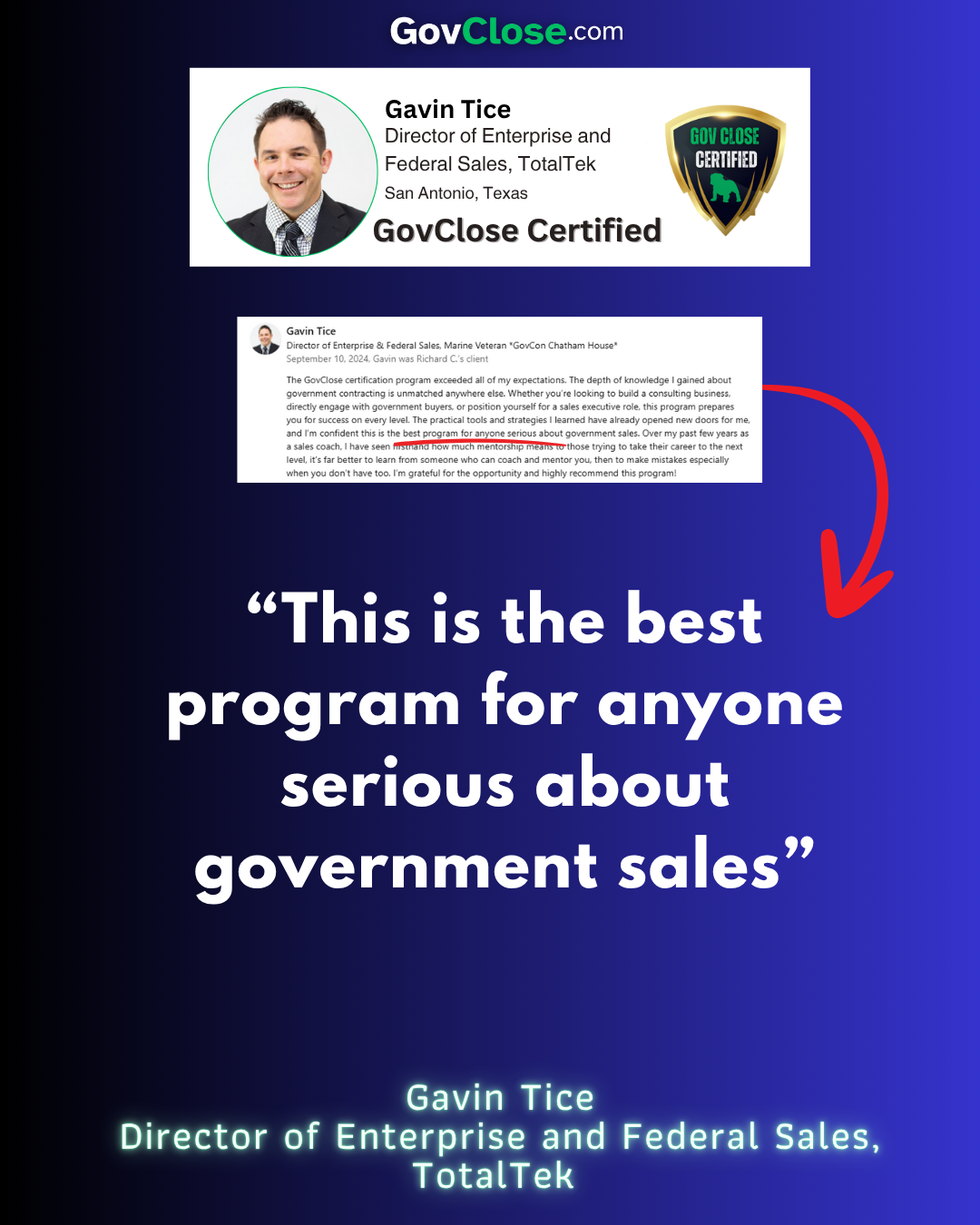
We Changed Our Name! (Podcast Transcript)
Oct 16, 2022[00:09] Richard C. Howard: Hey, guys, Ricky here with the DOD contract academy podcast. And so for those of you that have been listening for a while, you'll notice that today the first podcast that I've done under the new name DOD contract academy. So till now we've been using government sales momentum. So we've been kind of broadly discussing how you sell products and services to the US government. But what we found is whether it's our clients and our students that are in the Dodcontract academy, which you can find at Dodcontract.com, or just our listeners and the messages that I'm getting, most of who the people that listen to this podcast are selling to is department of defense. Now, does that mean that if you're selling to the VA or another agency that you won't get anything out of the podcast? No, you certainly will. Most of the strategies and the tactics that we use applies to all of the agencies. Right. But in fact, many of our clients sell to agencies in addition to the department of defense. But mainly it is focused at the US. Military and there are specific strategies, techniques, and things you need to know if you're selling to the military.
Aside from that, I also, of course, was an acquisitions officer in the military. So this is something that's near and dear to my heart. Let's talk about why focus on the military because it makes sense for a lot of companies. First of all, you have to focus. And if you've listened to the podcast, if you've read our blog or any of our materials or been through our training, you know how important it is to focus on a customer, knowing exactly what offices are buying, what you sell. The federal government is actually an amazingly large place. And to truly understand your customer, to find opportunities ahead of time and to start winning contracts, you really have to be focused. And with just about every company out there, you're really going to find that the US Military, this is a big difference between the military and all of the other agencies.
The US Military, yes, it's about weapons, certainly weapon systems. You think about aircraft, you think about the big defense contractors. But the US Military is really about people. So really, almost no matter what you're selling, the US Military is probably buying it. In fact, there was only one thing. I believe it was a marijuana company that contacted us and like, hey, Rick, is there something that federally we could sell to? And I was thinking, well, this has to be the one product that I'm not going to find as I'm searching through sales, because of course that's federally illegal. But sure enough, I found it and it was probably being used for testing or something it was a while back. But the point is that the US Military buys just about everything that you can think of. And if you think about a military base, it's a small town or small city, right? And they're all over the world. So if you bring somebody onto a military base so you've never been on one. And I've got especially after the military, after my Air Force career, and when I started helping businesses sell to the government, I would often take clients onto a base for the first time for a meeting, and, you know, their eyes will light up and they look around, they go, what on earth is going on here? Like, it's not what they pictured, right? Because what they're seeing is a community, right?
They are like there's schools and there's football fields and there's kids playing and there's homes, there's neighborhoods where people are living. And then, of course, there are office buildings with tons of not just military, but also government civilians and contractors working. Sure, there are things like a flight line if you're on an Air Force base and you'll see aircraft and some really cool technology, and there's certainly that aspect as well, but there's also movie theaters and bowling alleys in supermarkets and food. So everything that you would need to support a town or city, you also need infrastructure wise to support a base, just depending on how big it is. So whether you're selling landscaping services or even accounting in legal services, or you provide entertainment, or maybe you just sell something simple like commodities or office supplies, or, you know, maybe you own a Chip filet and you're thinking about, hey, where are some places that we can go?
Meaning a franchise food place. There are malls on these bases where people set up shop and sell lunch to everybody that's working on the base. So really, it's just about everything, and it's all over the world. So because of that, there's a huge amount of buying across all industries. And then you add on top of that the mandate to spend at least 23% of their contract dollars on small businesses. So for small business owners, what you've got here is you've got a niche, which less than 1% of small businesses ever even registered to sell to the government. So most small businesses are not targeting military sales. And aside from the fact that the US military buys just about everything, another reason we refocus the podcast is, you know, it's for me, it's more of a patriotic duty as well, right? Because when you sell to the military, you're supporting the men and women in uniform. And for me, that's very important, right?
So no matter what it is, whether you're providing a service or you're selling a product, as long as it's a superior product, it's a good product. You're helping the men and women in uniform. And what I always found is, on the acquisition side, when I was in charge of finding companies to put on contract to solve our problem sets, I found that small businesses with innovative technologies often weren't even thinking about selling to the US military. And we'd have to get in and kind of teach them about that. And maybe they were interested, maybe they weren't. But it was striking to me how many weren't even attempting to sell or were frustrated with the process.
So I really want to refocus on the military piece selling to the DOD and of course, our training, our online training is also Dodcontract Academy, which you can see at Dodcontract.com, and that's where we have the on-demand training from. This is how you register to sell to the government all the way through our advanced strategies, right? So that's how you find opportunities ahead of time. You've often heard me say you win defense contracts and really government contracts in general before the Solicitation comes out. And what I mean by that is it's the work that goes in before the Solicitation coming out that allows companies to be successful time after time. And that doesn't mean there's anything unfair going on. There's a whole market research phase for the government before Solicitation comes out. And we teach companies how to really work within that phase to find the opportunities to influence and not just influence what's going to be in the Solicitation, but potentially influence who the government wants to put on contract and how.
So if you think about it, when the government, when the Department of Defense or any other agency says, hey, we're setting this aside for a woman owned small business, well, that determination has to be made somewhere, right? And it's happening usually before that Solicitation ever comes out. They have to determine, hey, are we going to set this aside for a woman and small business? Or are we going to set this up for eight A or a specific contract vehicle? Right? Maybe you're on GSA or maybe you're on NASA Super, another big GWAC. And I have plenty of podcast episodes you can listen to to learn more about that. Well, that's where you're going to really affect that. So those are the things that we're teaching in Dodcontract Academy. Again, if you're disappointed because you are selling to another agency, you can certainly reach out to us on the website if you need something a little more specific. But I think for us, it makes a lot of sense to refocus on who most of our clients are selling to, which is the DOD.
And one last piece, a lot of small businesses, small business owners that listen to this are involved with some type of innovative technology. And within the US Military, there are a lot of programs that are doing really well as far as how we sponsor these technologies, these companies, how they can acquire funding to keep developing those products and solutions. And they're doing amazingly well. Some of them have been on the podcast and have been interviewed. Things like the SBIR program and STTR. Places like DIU Defense Innovation Unit, AFWERX. There's a system called Vulcan with some of the Special Forces units that are using which are amazing places to find money to essentially build out your product or solution or improve it, get it in the hands of the war fighter. So that's where we're going to focus. Thank you for listening. Our next episode is going to be great. We're going to do a little mix here of interviewing successful companies that are selling to the Department of Defense and really killing it, as well as breaking down different industries, like industries for instance, you might not even think of, like real estate, which will probably be our next one, and how the US. Military is going to be buying within there. And I'll sprinkle in some stuff from some of the other government agencies just in case you're looking elsewhere. But again, that's the new focus. Thank you for listening, really appreciate all the time and all the questions and the comments and everything that we get from our listeners. Don't hesitate to go to Dodcontract.com, leave a comment and please keep subscribing to the podcast, leave a review and we will see you in the next episode.
If you enjoyed this episode, you can also check out my interview with Brian Streem who won 5 Direct to Phase 2 SBIR Contracts where he candidly discussed his strategies that won 5 direct to phase two SBIR contracts!
Turn Government Contracting Knowledge Into Income
This isn’t a course. It’s a certification and implementation system to help you build a consulting business, land a high-paying sales role, or scale your own company in federal contracting.
We hate SPAM. We will never sell your information, for any reason.


